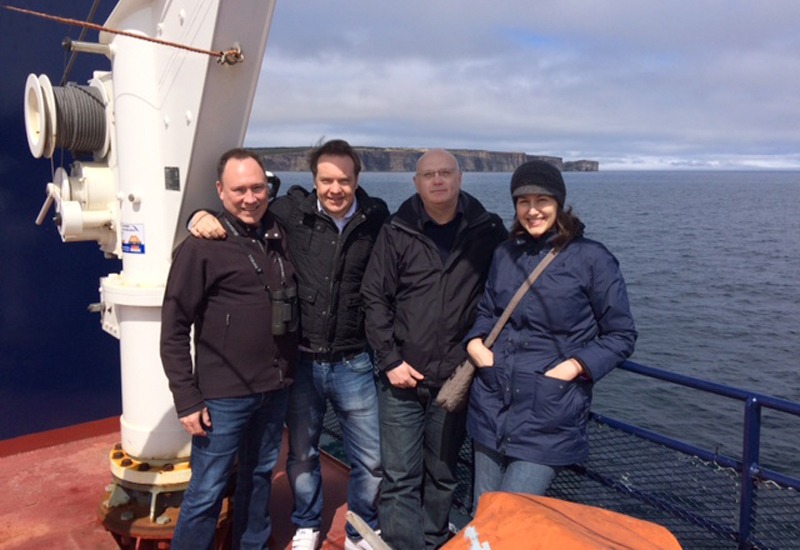Continuing connection

New academic appointments at Memorial’s business faculty will advance research and understanding of social enterprises in the province.
Dr. Neil Stott and Prof. Paul Tracey from Cambridge University’s Judge Business School in the United Kingdom (U.K.) have been appointed adjunct professors at the Faculty of Business Administration, effective July 1.
“Both Prof. Tracey and Dr. Stott are respected scholars in the area of social innovation, and the business faculty and the Centre for Social Enterprise will benefit greatly from this relationship,” said Dr. Isabelle Dostaler, dean of the business faculty.
Dr. Stott and Prof. Tracey are co-directors of the Cambridge Centre for Social Innovation.
Mutual interests
Their relationship with Memorial began in 2016 when Dr. Natalie Slawinski, an associate professor of strategy at the business faculty and current director of Memorial’s master of business administration in social enterprise and entrepreneurship (MBA-SEE) program, visited Cambridge.
“We had the opportunity to discuss our mutual interests in place, community and community enterprise,” said Dr. Stott. “We later visited Memorial to deliver a guest lecture and share our experiences of setting up a centre for social innovation, master’s program and social venture incubator.
“We quickly realized that Newfoundland and Labrador is an amazing place, not least in its rugged beauty.” – Dr. Neil Stott
“We quickly realized that Newfoundland and Labrador is an amazing place, not least in its rugged beauty. In rising to numerous challenges, including overcoming exploitation such as in the merchant system in the fishing industry and economically shattering events like the cod moratorium, Newfoundland and Labrador has been at the forefront of what we now call ‘social innovation.’”
Reciprocal relationship
Adjunct professorships enable formal academic relationships with the university that fall outside the normal categories of university teachers. They often are established with individuals at other post-secondary institutions.
“Our appointment cements a reciprocal relationship between the Cambridge Centre for Social Innovation and Memorial, in particular the Faculty of Business Administration and the Centre for Social Enterprise,” said Prof. Tracey. “Such a relationship brings immeasurable value to our centre, students and our own research agenda. We hope that we have the opportunity to meet and work with colleagues from across Memorial in the years to come.”
To date, Prof. Tracey and Dr. Stott have visited Memorial three times to lecture and explore local social enterprises. They are collaborating with Dr. Slawinski on some academic publications, and Dr. Stott is working with Dr. John Schouten, Memorial’s Canada Research Chair (Tier 1) in social enterprises, on a federally-funded research project involving Fishing for Success in Petty Harbour.
Dr. Slawinski and Nicole Helwig, manager of Memorial’s Centre for Social Enterprise, were also named Fellow of Social Innovation at the Cambridge centre in 2017.
“Given our mutual interests and the exciting work being undertaken at Memorial, we were keen to be engaged formally, initially as visiting social innovators and now as adjunct professors,” said Prof. Tracey. “We are keen to share and learn from Memorial faculty and students.”
Social innovation leaders
Prof. Tracy is a professor of innovation and organization whose research is concerned with the distinctive management challenges of leading social purpose organizations that generate their income through market-based activity.
An ethnographer by training, he held an Economic and Social Research Council Mid-career Fellowship from 2010-2012, during which he conducted an in-depth participant observation study of a leading social enterprise. The study focused on how community-based organizations may become stigmatized for helping unwelcome parts of the community, and the implications for organizational outcomes.
Dr. Stott is a faculty (reader level) in management practice and director of the master of studies in social innovation. He’s studied social innovation in poor places as well as the role of entrepreneurial third sector organizations.
He was chief executive officer of Keystone Development Trust from 2003-2015, one of the largest development trusts in the U.K., delivering community development, social enterprises and property development. Dr. Stott has also been head of community development at Canterbury City Council, principal officer (community) at Cambridge City Council and worked for charities such as Mencap, Contact-a-Family and Elfrida Rathbone Society.